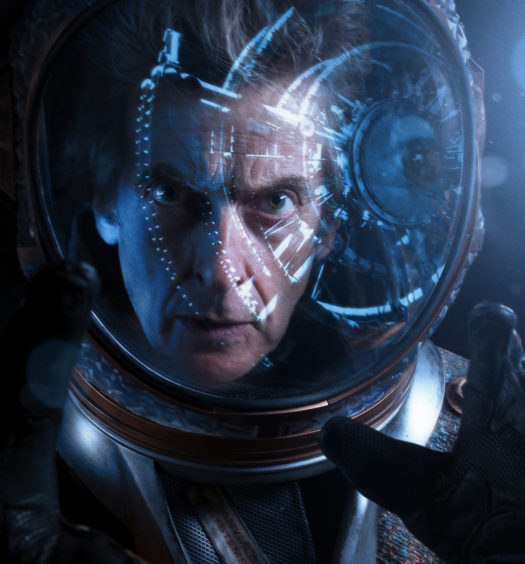All Fall Down: Being Human (U.K.) Season 4 Recap

And then there were none. And then there were three.
This season, Being Human showrunner Toby Whithouse pushed his series’ world-building to the limit, wrapping it around both the fate of humanity and one little girl. As it turns out, this approach was more than a swan song – it was the opening strains of something (sorta) new.
Big SPOILERS ahead from this point.
In the end, Annie got her gun.
More accurately, a bunch of explosives – with an F-bomb thrown in for good measure in the original English broadcast; boo on you, BBC America – and with them, the destruction of not only the much-ballyhooed Old Ones, but, somewhat surprisingly, baby Eve, as well. Annie’s sacrifice turned out to save humanity from the vampire uprising we heard about in the season premiere and gave Annie her final Door to a peaceful fterlife.
Even considering the generous handwave by alt-future Eve, who explained that only her death would save the world, for Whithouse to literally pull the trigger on the kid showed some guts (but, thank goodness, no blood and guts. On her, anyway.)
Though it’s hard to say how much of the character’s arc was set in stone before Lenora Chrichlow’s castmates said goodbye prior to this year, the writing was on the wall for Annie pretty glaringly once we saw Hal’s budding paramour, Alex, still kicking around as a spirit. After all, the show moved through guest-creatures so rapidly this year, for one not to shuffle off should’ve twigged everybody’s antennae.
And so now we’re left a whole new take on the show’s familiar set up. Next year, it’ll be Two Bros and A Brogue. But in keeping with the Power of Three rule, let’s talk about three things the show did well this season.
Seeing The Band Get Together:
-
When the series began wayyyy back in 2008, Annie,
Mitchell
-
and
George
-
after they’d established themselves as a unit; Annie was the newest member, but she was already haunting their home in Hull, and Mitchell and George’s brotherly bond had already been forged. Annie being the last person left forced her to seek new bonds with Hal and
Tom
-
the werewolf.
The upside for the viewers was, it allowed the creative team to define Hal and Tom as Not Mitchell And George. Who knew Hal and Tom’s biggest shared quality was the fact they were both walking anachronisms? Hal was an Old One, but Tom was disarmingly old-fashioned, giving their shared explorations of modern culture a new spin on the series’ trademark relatable charm, without revisiting George/Mitchell territory. Also, spare some sympathy for Damien Molony; you know the guy’s going to be asked to sing like this for the rest of his days.
The Revolving Rogues Gallery:
-
As noted earlier, this season the show threw seemingly more Special Guest-Villains at us than ever before. And as frustrating as it could be to see our heroes not talk their respective issues out until it was almost too late, at least the antagonists were entertaining, beyond Mark Gattiss’ reliably oily turn as
Mr. Snow.
Top of the class honors have to go to Cutler, who, besides serving as one of the Big Bads, was a useful tool for Whithouse and friends to tweak the show’s vampire lore. Cutler’s exasperation at his species’ archaic ways and self-absorption dovetailed nicely with his love for social media, and eventually gave the revelation of his history with Hal more oomph, setting the stage for one of the series’ more memorable exits.
Also, honorable mention to James Lance’s turn as Kirby – not only was his episode a great use of the old Yoko Factor trope, but it gave us this. And even if their introduction was a bit suspicious – suddenly we find out there’s been another Shadowy Group beyond the reach of even the vampires? Really? – if nothing else, it’ll be interesting to see just how far Mr. Rook and his Men In Gray reach.
The New Band:
-
For a number of reasons, even if Annie, Hal and Tom overcame their differences, their trio just never clicked; after the events of last season, Annie’s insistence on keeping a chipper face seemed strained at times, and this season’s pace allowed for less bonding time between herself and the new boys. Though Annie did
lampshade
-
this, admitting the losses of George and Mitchell had gotten to her, it did seem to take us a little too long for her to live up to her potential.
Annie’s gloominess, though, did set up Alex as more of a breath of fresh air – her reaction to not just passing on, but to Hal’s role in it, was amusing in its frustration and a welcome change of pace from the usual angst. And though the end of the season brought with it a return to the familiar (the ghost is the only woman in the Trinity) at least there’s a new jumping off point for fans, and for Whithouse to draw in more corners of his characters’ strangely relatable world.



